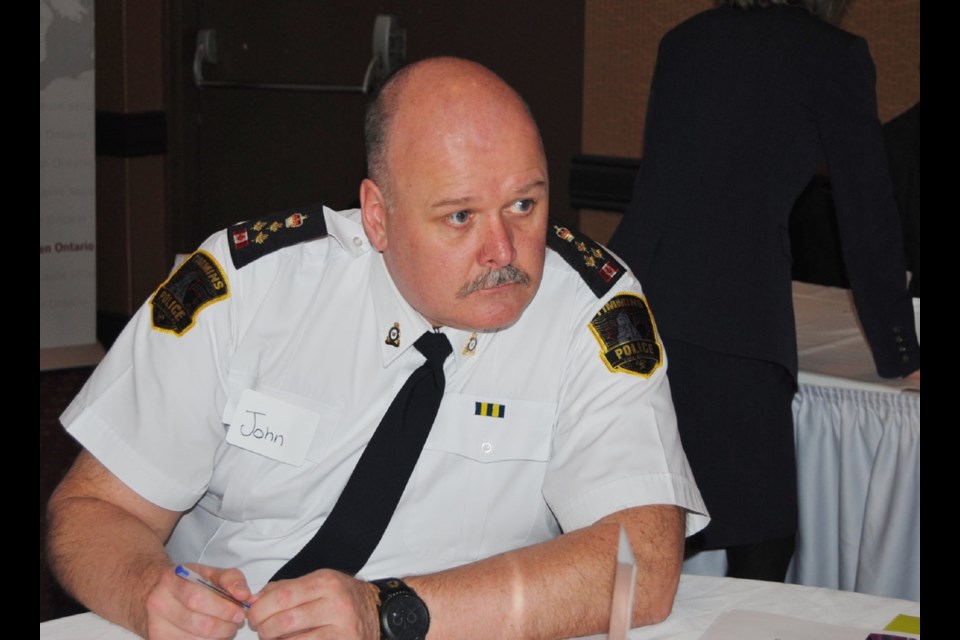Representatives from the Ministry of Community Safety and Correctional Services (MCSCS) met with Timmins Police and community groups to obtain recommendations for revising the Police Services Act.
The meeting labeled A Strategy for A Safer Ontario took place at the Ramada Inn in Timmins.
“The PSA which was last amended in 1990 and is in need of revisions to address new developments in policing and community concerns,” said Mary Pat, of GCI Canada the meeting facilitator.
Factors that have necessitated revising the Police Services Act include:
- The role of police has evolved - with more calls concerning vulnerable people such as the mentally ill, the homeless and those with drug addiction issues
- The rise of e-crime, identify fraud and child pornography with the advent of the Internet.
- Introduction of new high tech community safety tools have been developed
- Public demand for stronger oversight and more accountability for the police
“It’s a great opportunity for Timmins Police and community groups to have a hand in shaping the revised Police Services Act,” said Timmins Police Chief John Gauthier.
“We need to be responsive to changes that will make our community safer and help us improving policing and to serve the public better,” he added.
Chief Gauthier noted that Timmins Police Services has taken steps to protect members of vulnerable communities through its work with Timmins & District Victim Crisis Assistance & Referral Service (VCARS) and the Timmins and Area Women in Crisis organizations.
Those participating in the consultation session included the Timmins Native Friendship Center, The Timmins and Area Women in Crisis, Timmins and District VCARS, Ontario District School Board North East, the Ministry of Children and Youth Services Youth Justice Division.
Councillor Rick Dubeau represented City of Timmins Council.
Participants were asked to provide direction on four major themes:
- Ways to improve community safety and well being
- Modernizing what police do
- Improving the education and training of police officers
- Accountability to the public
Recommendations included increased training for police in using de-escalating techniques; mental health training for police and increased mental health services in the community through organizations like the Canadian Mental Health Association and area schools.
The use of social workers and other experts as part of a team of first responders was also suggested.
Andrew Ferrier a youth parole officer with MCYS said the Timmins district sorely needs a shelter for youth in crisis and the use of mobile mental health centres and tele-psychiatry to help counsel youth in remote communities.
“Food security and affordable housing for young people are two issues that need to be addressed,” said Michael Raiche, the manager of parole services for Timmins District office of MCYS.
More Aboriginal community involvement in policing issues in Timmins was desirable according to a representative from the Timmins Native Friendship Centre along with training of police officers about First Nations culture.
Some in the room also wanted to see police officers require post-secondary degrees with studies in law and social work. for becoming a police officer. Currently a grade 12 diploma is sufficient.
There was a general consensus that police core services need to be clarified, but there was an equal consensus against using private security firms to deal with non-essential duties such as ticketing and by-law infractions.
“I think it is a great idea to relieve our police officers from non-essential services, but only if that doesn’t lead to reducing the number of police officers,” Gauthier said. “We would welcome increases to our budget to hire staff that would look after non-crime calls.”
“Private firms would be less accountable to the community, they would be less trained and could detrimentally affect community safety,” said Stephen Reid, Executive Director of the Police Association of Ontario.
The use of body cams as a way of recording the police response to a call was considered to be valuable when police arrive at the scene of a domestic dispute
However, Lindsay McAllister, the executive director of the Timmins and Area Women in Crisis Centre said they could not support their use by police officers entering the crisis centre.
“Women who have been brought to the centre to escape an abusive relationship need anonymity and may be reluctant to be video recorded,” she said.
For more information on A Strategy for A Safer Ontario click here www.ontario.ca/safercommunities
Future meetings will be held at the following locations:
Sault St. Marie March 7
Bancroft March 9
Windsor March 17
Stratford March 18
Toronto March 22
Brampton March 23
Kenora March 29
Sudbury March 31
Cornwall April 1



